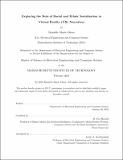Exploring the role of racial and ethnic socialization in virtual reality (VR) narratives
Author(s)
Olson, Danielle Marie.
Download1102050978-MIT.pdf (12.00Mb)
Other Contributors
Massachusetts Institute of Technology. Department of Electrical Engineering and Computer Science.
Advisor
D. Fox Harrell.
Terms of use
Metadata
Show full item recordAbstract
Race and ethnicity impact a number of experiences in the physical world, most of which are seldom modeled in virtual worlds. Even when race and ethnicity are taken into account for the design and implementation of characters and avatars, they are often only thought of as graphical customizations (e.g., skin color). This approach to the virtual representation of race and ethnicity lacks the depth necessary to meaningfully engage players from a wide range of identity backgrounds in transformational virtual storytelling experiences. Towards the goal of improving approaches to virtual race and ethnicity representation, this thesis proposes a new computational model of racial and ethnic socialization (RES) for the design and implementation of interactive VR narrative games. The key contributions of this thesis include the development of interactive VR narrative game called Passage Home VR and the results and analysis of a user study evaluating this videogame system. Central to Passage Home VR is an interactive narrative model steered by body language driven game mechanics and a novel embedded computational model of RES theory. The upshot is that this approach resulted in an engaging narrative system successfully conveying themes grounded in a social science model of how individuals cope with racial discrimination. The user study investigated how players interpreted the narrative experience and their strategies and decision-making using a body language driven interaction mechanism to respond to this racialized encounter. In summary, this research investigates: (1) how players' racial and ethnic socialization (RES) influences in-game behavior and how they experience emotions, perceive characters, themes, and events in VR narratives, (2) how RES can be computationally modeled to support virtual race and ethnicity representation, compelling interactive narrative storytelling, and potentially to social scientific research, and (3) how body language can be used to inform the design of interaction mechanics in interactive VR narratives simulating social phenomena.
Description
This electronic version was submitted by the student author. The certified thesis is available in the Institute Archives and Special Collections. Thesis: S.M., Massachusetts Institute of Technology, Department of Electrical Engineering and Computer Science, 2019 Cataloged from student-submitted PDF version of thesis. Includes bibliographical references (pages 177-190).
Date issued
2019Department
Massachusetts Institute of Technology. Department of Electrical Engineering and Computer SciencePublisher
Massachusetts Institute of Technology
Keywords
Electrical Engineering and Computer Science.